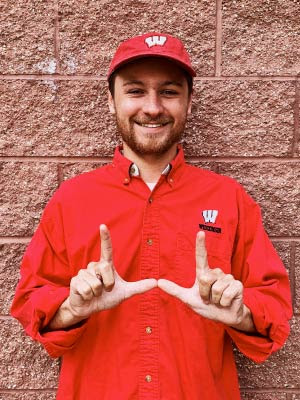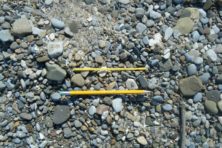Egg Harbor Pushes for a Future Free of Single-Use Plastics
- Share
- Tweet
- Pin
- Share

by Janel Hutchison
The Village of Egg Harbor has partnered with the UniverCity Year program (UCY) to take on what could be the village’s most ambitious plan yet as a Green Tier Community: eliminating single-use plastics.
UCY is a University of Wisconsin-Madison program that connects university education, service and research activities with cities to further the practice of sustainability. In UCY’s partnership with Egg Harbor, the goal of eliminating single-use plastics is viewed as essential to protecting the health of Egg Harbor’s coastline, as well as encouraging sustainable living for its residents and visitors.
“There are thousands of people that are going to visit here annually, and we started thinking about what we can do to minimize their environmental impact,” said Lydia Semo, Egg Harbor’s environmental and sustainability coordinator. “So, we set this goal to eliminate single-use plastics, not only to minimize pollution, but to inspire our visitors to act more sustainably when they return home, and inspire our residents to travel more sustainably as well.”

Egg Harbor became a Wisconsin Department of Natural Resources Green Tier Legacy Community in 2017. The voluntary program provides supportive resources to businesses and communities that commit to taking a systematic approach to improving their environment. The village has already installed LED lights along the village roadways, performed energy-use evaluations and expanded its recycling and composting programs.
“Being a Green Tier Community has really helped us a lot,” Semo said. “It’s helped us better communicate and network with other communities in Wisconsin. And there’s just been nothing but positive sustainable goals, education and communication that have come from it.”
Eliminating single-use plastics is one of six sustainability projects that UCY is assisting with during its partnership with Egg Harbor through 2022. The project took off in the summer of 2020, when UW-Madison undergraduate Dylan Lennie – a senior double-majoring in environmental studies and physical geography – took on the initiative as the focus of an independent student research project.

Lennie began working with Semo in 2020 to develop a plan to eliminate single-use plastics such as plastic beverage bottles and caps, food wrappers, plastic grocery bags, styrofoam take-away containers, straws, and coffee-cup lids. The plan was to survey the plastic consumption of Egg Harbor businesses and then conduct a cost-benefit analysis for replacing plastic materials with compostable products.
But 2020 had other plans. With the onset of the COVID-19 pandemic, Lennie said it became clear a month into the project that it was not the right time to ask businesses to commit to plastics reduction.
“The businesses were more worried about how they would get through the summer health-wise,” he said. “Switching to compostable products wasn’t on the front burner.”
Instead of pushing businesses to eliminate plastics immediately, Lennie launched a communications campaign aimed at educating business owners about the negative impact of single-use plastics in the Great Lakes region and informing them of Egg Harbor’s goal to eliminate single-use plastics. He began calling and emailing business owners to get the conversation started. After several weeks of trying to connect remotely, however, Lennie said he felt as though he had hit a wall.
“I realized pretty quickly that I wasn’t going to get a lot done if I couldn’t physically go into businesses and knock on doors and talk to owners to see what people were thinking about the project,” he said. “So, I drove up there one weekend and printed out flyers and walked door to door [with Lydia Semo]. That was very successful. I got more done that weekend than I had accomplished in the past three weeks in terms of just general communication.”
Lennie was aware of the challenges he would face as an “outsider” arriving in Egg Harbor to speak with business owners about transitioning away from single-use plastics. He said he initially felt some nervousness about going door to door, not wanting to be perceived as a stranger telling people how to run their businesses.
“It can be hard coming into a small community as an outside voice and getting people to understand you and trust you, and [Dylan] did a really nice job with that,” Semo said.
Lennie said the majority of business owners were on board with and excited about the village’s initiative. He also gave a presentation at a virtual town-hall meeting, where he shared with business owners and residents how to make more sustainable lifestyle choices.
Although the pandemic may have set back the timeline for eliminating single-use plastics in the village, Lennie feels confident in Egg Harbor’s ability to establish a future free of single-use plastics. Likewise, Semo said she’s encouraged by the progress made through UCY’s partnership with Egg Harbor last summer. There is much more work to be done, but she has faith that through the village’s determined, forward-thinking spirit, a more sustainable future for the Great Lakes region is on the horizon.
“We [in Egg Harbor] have held ourselves to that standard of being the trailblazer and setting forth these sustainable initiatives,” Semo said. “It’s really a community effort. I’m glad that we’re able to do what we’ve been doing, and I’m even more glad to see that other communities are following in our footsteps.”
Janel Hutchison is a UW-Madison senior and a communication assistant at the Nelson Institute for Environmental Studies. She’ll graduate with a bachelor of science degree in May, with majors in life-sciences communication and community and environmental sociology. Reach her at [email protected].



